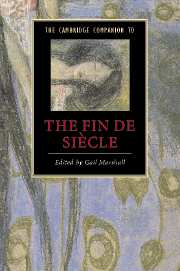Book contents
- Frontmatter
- Introduction
- 1 Psychology at the fin de siècle
- 2 Decadence and aestheticism
- 3 Sexual identity at the fin de siècle
- 4 Socialism and radicalism
- 5 Empire
- 6 Publishing industries and practices
- 7 The visual arts
- 8 The New Woman and feminist fictions
- 9 Realism
- 10 The fantastic fiction of the fin de siècle
- 11 Varieties of performance at the turn of the century
- 12 Poetry
- Guide to further reading
- Index
- Series List
Introduction
Published online by Cambridge University Press: 28 September 2008
- Frontmatter
- Introduction
- 1 Psychology at the fin de siècle
- 2 Decadence and aestheticism
- 3 Sexual identity at the fin de siècle
- 4 Socialism and radicalism
- 5 Empire
- 6 Publishing industries and practices
- 7 The visual arts
- 8 The New Woman and feminist fictions
- 9 Realism
- 10 The fantastic fiction of the fin de siècle
- 11 Varieties of performance at the turn of the century
- 12 Poetry
- Guide to further reading
- Index
- Series List
Summary
In seeking a mode in which to speak of the moment of the fin de siècle, one is immediately confronted by a history of conflicting narratives and trajectories. The term itself, of course, carries its own chronological presuppositions boldly before it, allowing barely the whisper of a continuity beyond the 'fin' to be heard. That lack of continuity is particularly emphasised in Oscar Wilde's employment of the term in The Picture of Dorian Gray (1891):
'Fin de siècle', murmured Lord Henry.
'Fin du globe', answered his hostess.
'I wish it were fin du globe', said Dorian with a sigh. 'Life is a great disappointment.'
This well-known moment occurs at Lady Narborough's house, in the midst of a particularly tedious evening, brought about by the sudden arrival of the hostess's daughter, who, 'to make matters worse, had actually brought her husband with her' (p. 201). The scene works by typically Wildean paradox and humour to ensnare readers into confronting their own prejudices and limitations, and to confound expectations. In particular, in a scene which immediately follows upon Dorian's murder of the painter Basil Hallward and the disposal of the body by Dorian's one time friend Alan Campbell, the expectation of endings, and the assumption of ennui, are confounded. Dorian's desire for a definitive ending, for sterility, a lack of continuity, his refutation of his life so far, the languor of his expressed desire, belie the extent of his visceral engagement with the sensational life which is the counterpart of his role as decadent icon. The extent of his languor testifies precisely to the extent of Dorian's awareness of his inextricable involvement with life, its continuities and complications.
- Type
- Chapter
- Information
- The Cambridge Companion to the Fin de Siècle , pp. 1 - 12Publisher: Cambridge University PressPrint publication year: 2007
- 2
- Cited by

